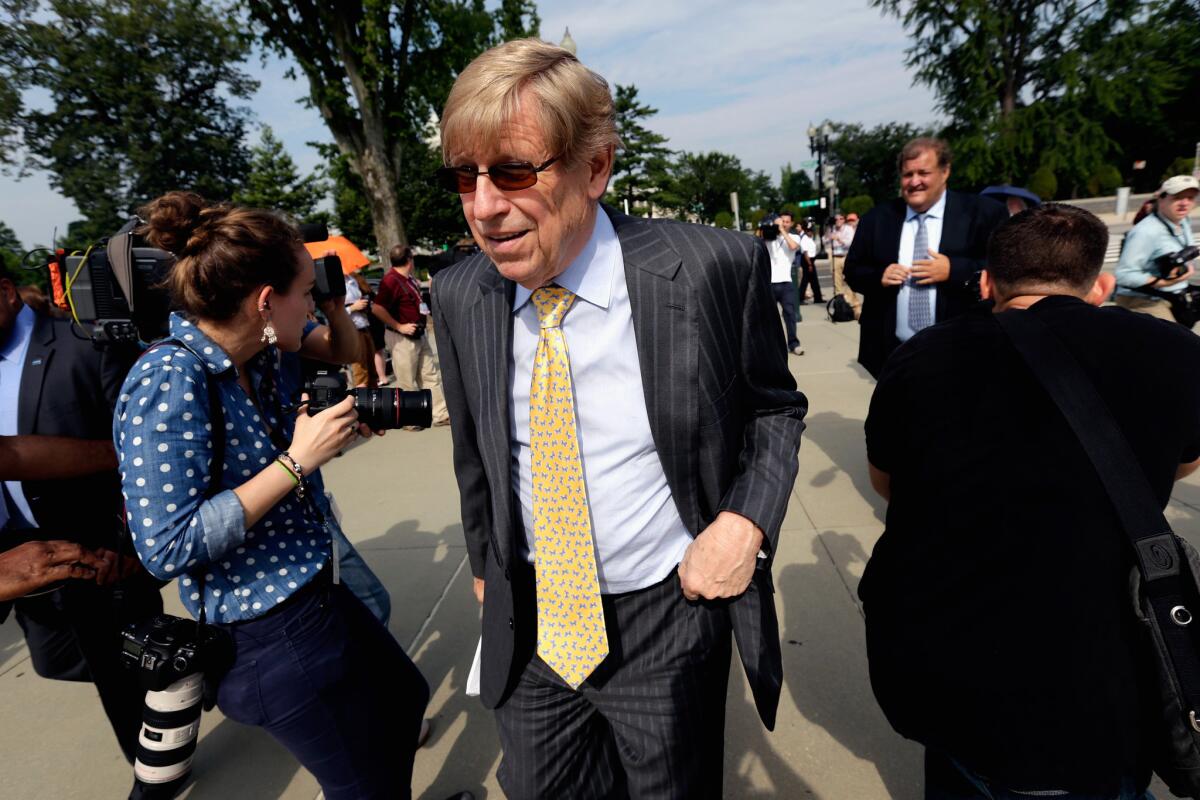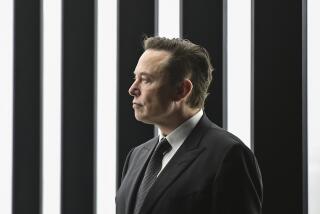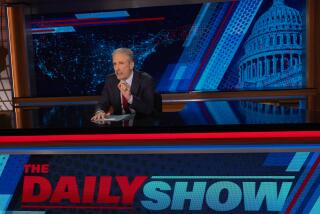Apple attorney: Unlocking San Bernardino shooter’s iPhone would open ‘Pandora’s box’

Attorney Ted Olson, seen in 2013, told ABC’s “This Week” that Apple has cooperated with federal authorities but must “draw the line at re-creating code, changing the iPhone.”
- Share via
To comply with the FBI’s demand to unlock mass shooter Syed Rizwan Farook’s iPhone would spring open “Pandora’s box,” endangering the privacy of millions of Apple customers here and abroad, an Apple attorney said Sunday.
“There’s no limit to what the government could require Apple to do if it succeeds this way,” attorney Ted Olson told host George Stephanopoulos on ABC’s “This Week.”
Olson said the tech giant has cooperated with the FBI “in every way the law required” in its investigation of last year’s massacre in San Bernardino.
But Apple “has to draw the line at re-creating code, changing its iPhone, putting its engineers and creative talents to destroy the iPhone as it exists,” said Olson, a former U.S. solicitor general under President George W. Bush.
Then, in a plain-spoken rejoinder late Sunday night, FBI Director James Comey said he hoped “folks will take a deep breath and stop saying the world is ending, but instead use that breath to talk to each other.”
“We simply want the chance, with a search warrant, to try to guess the terrorist’s pass code without the phone essentially self-destructing and without it taking a decade to guess correctly,” Comey said in a statement. “That’s it. We don’t want to break anyone’s encryption or set a master key loose on the land.”
The remarks Sunday by Comey and Olson represent the latest back-and-forth in the clash between Apple and the Justice Department, a controversy that has pitted digital-age privacy concerns against advocates of national security.
The FBI is investigating the attacks by Farook and his wife, Tashfeen Malik, as the deadliest act of terrorism on American soil since Sept. 11.
On Dec. 2, the couple armed themselves with combat rifles and stormed into a room at the Inland Regional Center, where Farook’s co-workers at the San Bernardino County Public Health Department were having a holiday potluck.
The couple killed 14 people and injured 22 others, and were killed in a shootout with police hours later.
That day, the FBI says, a message pledging allegiance to Islamic State had appeared on Malik’s Facebook page.
The government believes that Farook used his iPhone 5c — supplied to him by his employer, the Health Department, where he worked as a restaurant inspector — to communicate with some of his later victims.
The government said the phone “may contain critical communications” around the time of the shooting that only Apple can help unlock. The FBI has a warrant to search the iPhone, but Apple’s encryption technology prevents authorities from trying to break the pass code without risk of erasing the data altogether.
Last week, U.S. Magistrate Judge Sheri Pym of Riverside ordered Apple to assist the FBI in cracking the phone, prompting Apple Chief Executive Tim Cook to announce — in an open letter to Apple customers — that the company would resist. Cook said the FBI has asked Apple “to build a backdoor to the iPhone,” which it considers “too dangerous to create.”
“The government suggests this tool could only be used once, on one phone. But that’s simply not true,” Cook wrote. “Once created, the technique could be used over and over again, on any number of devices. In the physical world, it would be the equivalent of a master key, capable of opening hundreds of millions of locks — from restaurants and banks to stores and homes. No reasonable person would find that acceptable.”
The U.S. attorney’s office replied, in turn, with a motion to compel Apple’s compliance with the order. The government said it was not asking Apple to create a “master key” but to create software that opened this particular iPhone.
Apple could maintain custody of the software, the government motion said, and destroy it after the phone was unlocked. “It does not mean the end of privacy,” the motion said.
In his remarks Sunday on ABC, Olson said the clash had generated an “important national debate” about privacy and civil liberties, and that Congress should take up the issue.
Stephanopoulos asked Olson if Apple executives would be willing to go to jail in contempt of court rather than obey the Justice Department’s demands.
“I don’t want to get ahead of the judicial branch,” Olson said, noting that the parties were waiting for a hearing before the magistrate. Whoever won, he said, the other side would likely appeal, and the case might ultimately go to the U.S. Supreme Court.
“Remember, terrorists wish to change our lives,” Olson said. “They wish to take away our civil liberties. We can’t surrender our civil liberties and give the terrorists a victory that they actually seek.”
Another guest on the show, John Miller, the New York Police Department’s deputy commissioner of intelligence and counter-terrorism, said that Apple’s reaction was “entirely overstated” and that its portrayal of frightening government invasions of privacy was “absurd.”
The battle was over “a government-owned phone that belonged to two dead people who have no privacy rights, who are at the middle of a terrorist investigation, where the information on that phone could save lives,” Miller said. “I don’t know why we’re still talking about this.”
Comey, in his Sunday night statement, said “awesome new technology” creates a tension between privacy and safety that “should not be resolved by corporations that sell stuff for a living,” or by the FBI, “which investigates for a living.”
Instead, he said it was up to the American people to decide “how we want to govern ourselves in a world we have never seen before.”
Twitter: @LATChrisGoffard
ALSO
Why Apple’s fight with the FBI could have reverberations in China
Commercial carpooling (although it’s illegal) is growing in L.A., Uber and Lyft say
Trend of ransom payoffs to unlock malware from ‘electronic stickups’ troubles law enforcement
More to Read
Sign up for Essential California
The most important California stories and recommendations in your inbox every morning.
You may occasionally receive promotional content from the Los Angeles Times.











